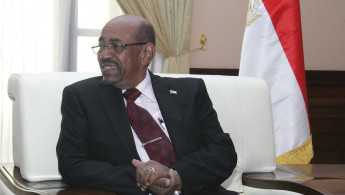US puts security first in new relationship with Sudan
It might be a small step, but there are important consequences to a visit by a Sundanese deputy to Washington last week. Ibrahim Ghandour is both Sudan's assistant to President Omar al-Bashir and deputy chairman of the National Congress Party (NCP). He was the first Sudanese government figure to make an official visit to the US for many years.
Washington has cut almost all relations with Sudan since 1993, accusing the African country of sponsoring terrorism. Sanctions were imposed on Khartoum in 1997, and diplomatic relations between the two countries hit a low after allegations of war crimes in the West Darfur region emerged in 2003.
Washington's aim
It appears that Washington's aim with Ghandour's visit is to pressure Khartoum to accept a proposal by Africa's mediator in the Sudanese crisis, Thabo Mbeki, for greater participation of all of Sudan's factions in the running of the country.
This would include a five-year transitional term presided over by Bashir, who has been in power since 1989. It is hoped the proposal will end decades of fighting in the country, by granting autonomy to the Blue Nile, South Kordofan, and Darfur, all of which complain of being marginalised by Khartoum.
However, sources say that Bashir rejected the proposal and has refused to negotiate. There is talk that Washington might rehash the plan to make it more palatable to Khartoum.
The Sudanese opposition and government will attend workshops in Germany at the end of February, which will be held separately but simultaneously.
Although the proposal was initially welcomed by separatist groups, they reportedly raised new demands when it became clearer that Bashir would not allow anyone to preside over the transitional phase to autonomy but himself.
But groups opposed to the Sudanese government also disagreed with the proposal, with many fearful that autonomy for regions would lead to their eventual separation from Khartoum, as with South Sudan, and the eventual breakup of the country.
Popular opposition
The Popular Congress Party (PCP), headed by Hassan al-Turabi, pre-empted Ghandour's return by announcing his party's rejection of Mbeki's proposal.
PCP political secretary, Kamal Omar Abdul Salam, told al-Araby al-Jadeed that the party had studied the proposal thoroughly before making the announcement.
"It repeats the historical mistake of the Comprehensive Peace Agreement that was signed by the government and the Sudan People's Liberation Movement (SPLM), the outcomes of which included the separation of the South," Salam said.
"PCP also rejects the proposed five-year transitional period and granting autonomy for Darfur, South Kordofan and the Blue Nile.
"We will not accept immediate agreements from the international community, and we support the inter-Sudanese dialogue and the Sudanese solution," he added.
Sudan's ruling party sent a message to Washington with Ghandour. Khartoum referred to Sudan's "pivotal role" in the region, and confirmed Khartoum's refusal to compromise on its political process including any halt to elections in April, which are being boycotted by opposition parties.
Cautious agreement
Moustafa Othman, NCP's political chief, speaking at a press conference, emphasised the importance of Ghandour's visit to Washington.
"We cannot deny that the US is a major power with influence all over the world, and we do not want to wage a war against it, but we have a certain issue that we want to resolve through dialogue and understanding," said Othman.
| The US has always been aware of the importance of Sudan, and that the situation in the region is tense. - Moustafa Othman, NCP |
"We want to play a role in regional issues, and more than anyone else, the US has always been aware of the importance of Sudan, and that the situation in the region is tense. The US knows that Khartoum has not been affected by violence and bombings yet, and that dialogue is our approach to resolve the disputes."
He said that Khartoum remains willing to listen to the US proposals but that it would not give up any of its "national principles" - or cancel April's elections.
Othman continued with a more conciliatory tone: "The dialogue will serve common interests. We do not have a problem with the US' interests in the region."
Analysts believe it is unlikely that Ghandour's visit will have a major effect on Sudan's policies. The ruling party has a history of confronting the US, and understands that the superpower is unable to impose any more sanctions on Sudan.
Stability above all
The ruling party also understands that the US priority in Africa is stability. Washington has become preoccupied by the threat of terrorism emerging in the region, particularly after the rapid growth of the Islamic State group.
This means that the US is likely to tread carefully with Sudan, and Khartoum also understands that having the backing of China and Russia makes it unlikely that new sanctions will be issued against it.
Abdul Moneim Abu Idris, a political analyst, believes it is unlikely that Ghandour's visit to Washington will significantly ease the tense relations between the two countries.
"The aim of the visit is clearly to discuss the situation in Sudan," he told al-Araby. "I do not think Ghandour had anything to offer to the US officials. He also does not have any power to take decisions without consulting Khartoum first."
Washington hopes the visit will put more pressure on Khartoum, and use a carrot and stick approach to resolve the political crisis in Sudan.
"Washington is facing a real obstacle; it cannot guarantee the possible consequences on the region if it puts too much pressure on Khartoum, and if it is too lenient, no political settlement will be reached," said Abu Idris.
This leaves Sudan with a stark choice - either to accept the US offers or to confront it. Both cases will impact Sudan internally, but it knows it's in a much stronger position than it has been for a decade.
This article is an edited translation from our Arabic edition.



